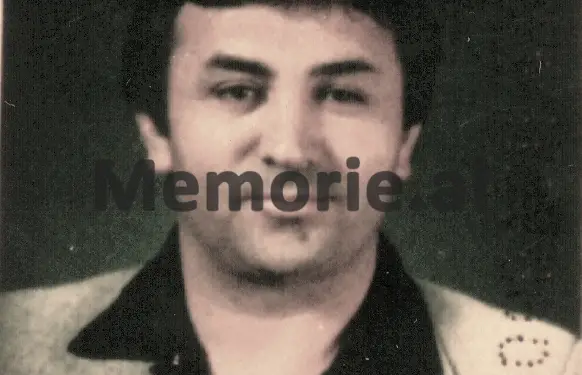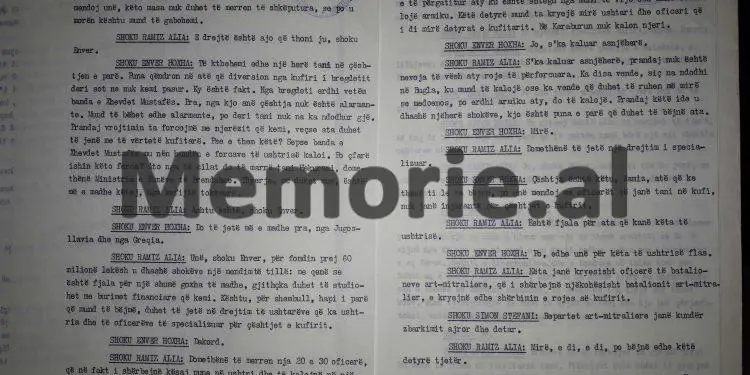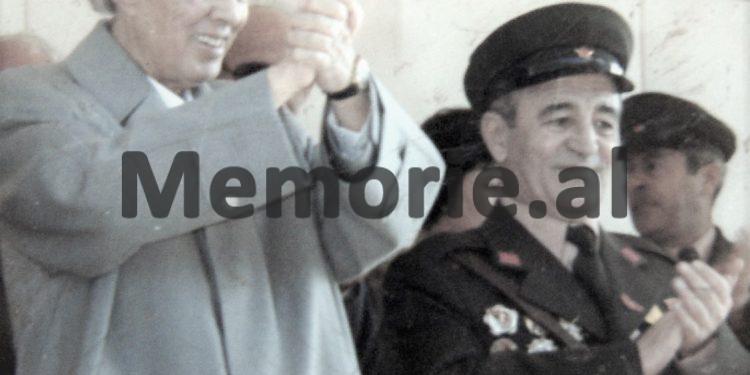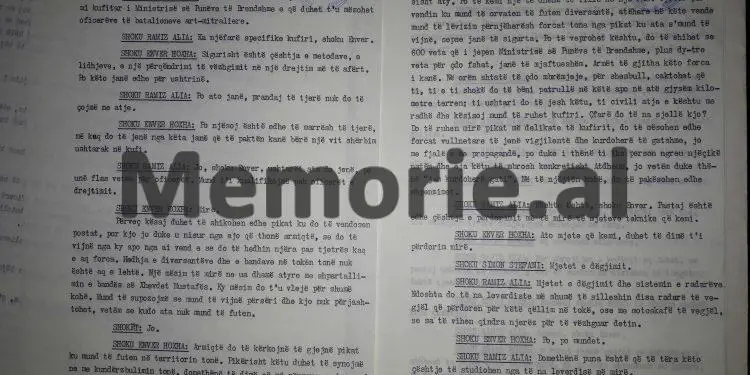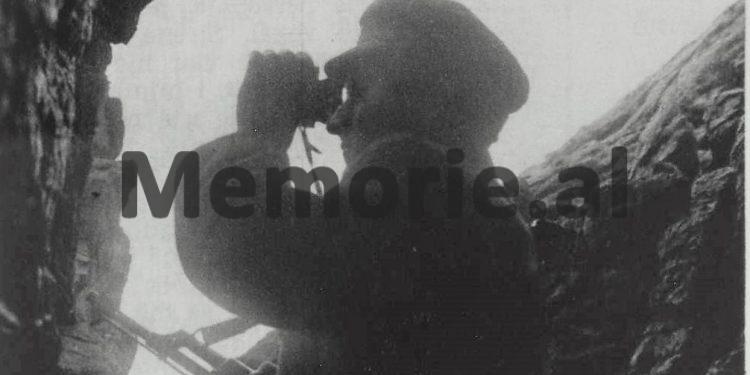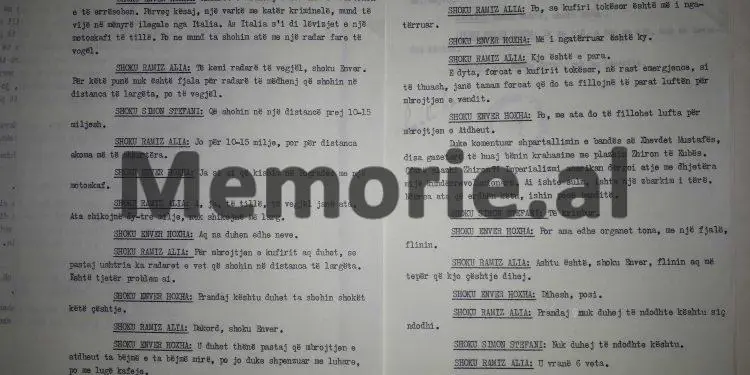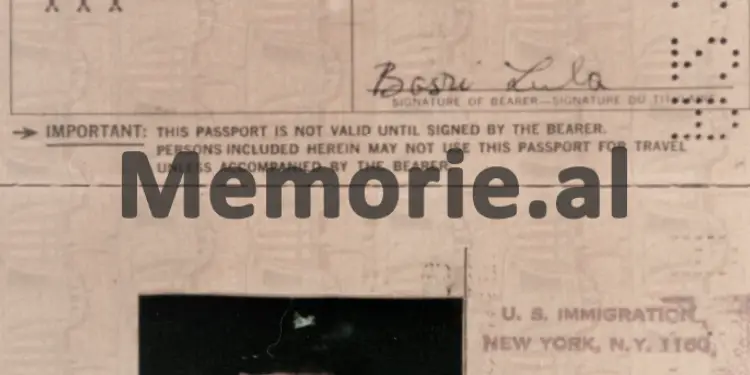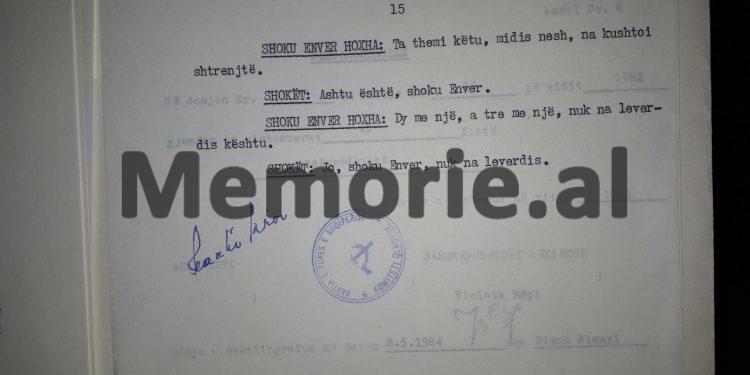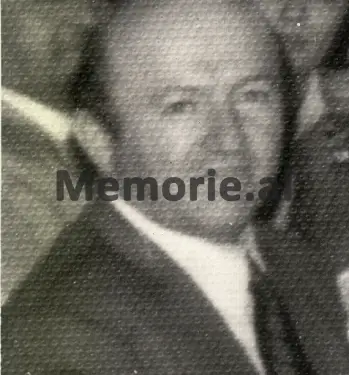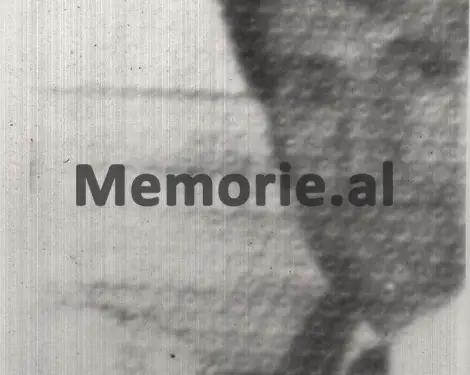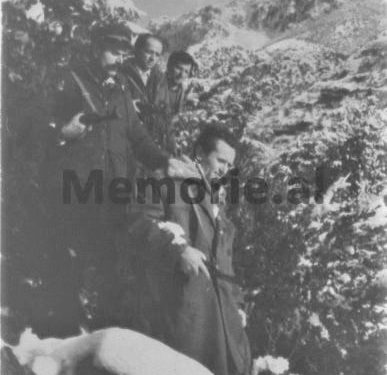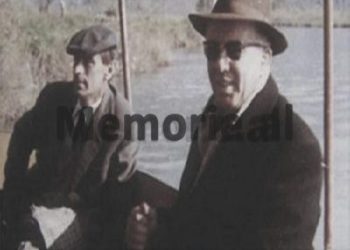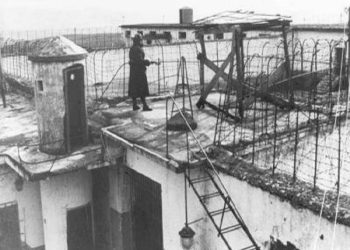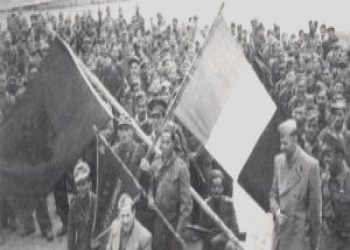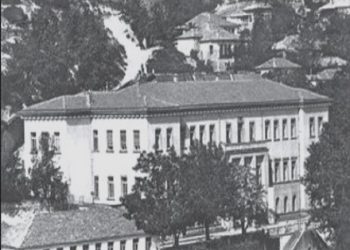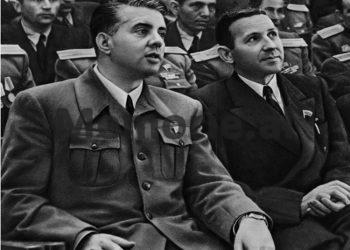Dashnor Kaloçi
The third part
Memorie.al publishes some archival documents issued by the Central State Archive in Tirana (fund of the former Central Committee of the ALP), which belong to the months of October 1982. Among other things, there is a report-information drafted from the group of instructors for the bodies of Internal Affairs, at the office of the Central Committee of the ALP, on the topic: “On some problems that emerged from the analysis of the event of September 25-26 in Lushnje”, which talks about the event of of the so-called “Banda Xhevdet Mustafa”, as well as the minutes of the meeting of the Secretariat of the Central Committee of the ALP, held on October 22 of that year, chaired by the First Secretary of the Central Committee, Enver Hoxha. The whole event of the “landing of the diversionist group” on the coast of Divjaka was analyzed, as well as “the measures that had to be taken, for the protection of possible landing points, on our coast”. Documents with the report-information of the group of instructors for the bodies of Internal Affairs, of the apparatus of the Central Committee of the ALP, where after the analysis made on the landing event of the “Xhevdet Mustafa Gang”, appropriate measures were taken against some of the main leaders of the Internal Affairs Branch of Lushnja district, starting from the chairman Kapllan Shehu, the deputy chairman, Mihal Loli, the Chief of Police, Fane Xhuveli, as well as Ismail Leskaj, who was taken under criminal responsibility. Minutes of the daily meeting of the secretaries of the Central Committee of the ALP, held on October 22 of that year, chaired by Enver Hoxha, attended by Ramiz Alia, Hekuran Isai, Simon Stefani and Rita Marko, who after discussing in detail and analyzing the event with the landing of the “Xhevdet Mustafa Gang”, discussed and laid out the concrete tasks, to enable the protection of the border of the Socialist People’s Republic of Albania, from any possible landing from abroad. It was decided that a contingent with about 600 effectives from the bodies of the Ministry of National Defense, would pass under the Ministry of Internal Affairs, with service for the protection of land and sea border, as well as the approval of a financial amount of about 100 million dollars from the state reserve fund, for the expenses needed to equip the border posts, with the necessary logistics, such as radar, etc.
Fund: CENTRAL COMMITTEE OF THE ALBANIAN LABOR PARTY
(Daily meetings of the secretaries of the Central Committee of the ALP)
– DAILY MEETING OF THE SECRETARIES OF THE CENTRAL COMMITTEE OF THE ALP ON OCTOBER 22, 1982
-FOR MEASURES TO BE TAKEN FOR THE PROTECTION OF POSSIBLE DISCHARGE POINTS ON OUR COAST (QUESTIONS AND DISCUSSION BY COMRADE ENVER HOXHA) (Pg.1)
-FOR INFORMATION (DISCUSSION OF COMRADE ENVER HOXHA) (P.4)
-FOR DEPOSITS OF THE ENEMY FEÇOR SEE AT THE ADDRESS OF KADRI HAZBI
(INFORMATION FROM COMRADE RAMIZ ALIA, SECRETARY OF K.P.)
22.10.1982
Continued from the previous issue
SECRET
Secret document with the minutes of the meeting of the Secretariat of the Central Committee of the ALP, chaired by the first secretary, Enver Hoxha
DAILY MEETING OF THE SECRETARY FRIENDS OF THE CENTRAL PARTY COMMITTEE
OCTOBER 22, 1982
In this meeting was discussed about the measures to be taken for the protection of possible landing points on our coast.
COMRADE ENVER HOXHA: So we have to think that whatever we do with them. Shall we pay the wages of the workers of the third shift? If we pay them and they stay home, this is not acceptable to us. So we have to put them in some jobs. Do we have work to do?! Yes we have. Of course Saranda workers cannot be sent to open canals in Gjirokastra. They have to be sent somewhere within the district and work in agriculture, paying you a salary, or three-quarters of it. Such a thing must be done.
COMRADE RAMIZ ALIA: That’s right, Comrade Enver.
COMRADE ENVER HOXHA: Of course this salary fund represents a fund that does not produce, i.e., that does not gain anything from saving electricity.
COMRADE RAMIZ ALIA: That’s right.
COMRADE ENVER HOXHA: The economy should not give anything from this measure, because there is no production.
COMRADE SIMON STEFANI: The reduction of electricity, we should do it out of necessity.
COMRADE ENVER HOXHA: Then, in order to have some energy reserves, you decide to stop it, but accepting that the salary of the third shift workers be paid. In addition to paying the workers on that shift, they also have to give something. If not all the produce they could give to where they were, at least half of it in order for the loss to be as small as possible. Therefore, I think that these measures should not be taken in isolation, because if they are taken like this, they may turn out to be wrong.
COMRADE RAMIZ ALIA: The truth is what you say, Comrade Enver.
COMRADE ENVER HOXHA: Let us return once again to the first issue. The work lies here that so far, diversion from the coastal border to date we have not had. This is a fact. Only Xhevdet Mustafa’s gang came from the coast. So from this point of view the issue is not alarming because, so far nothing has happened to us. So to strengthen the observation with the people we already have, they have to be really frontier. Why do I say that?! Because Xhevdet Mustafa’s gang passed under the nose of the army. What were these forces?! Those from which Hekurani will now receive, i.e., the Ministry of Internal Affairs. The break seems to me, it is bigger here from the land border.
COMRADE RAMIZ ALIA: That’s right, Comrade Enver.
COMRADE ENVER HOXHA: It will be bigger from Yugoslavia and Greece.
COMRADE RAMIZ ALIA: I, Comrade Enver, for the fund of 60 million ALL, gave such an opinion to my friends. Since it is about such a large sum, everything has to be studied from the financial resources we have. So for example, the first step we can take should be towards soldiers and officers specializing in border issues.
COMRADE ENVER HOXHA: Agreed.
COMRADE RAMIZ ALIA: D.m.th., to take some 20 or 30 who actually serve this job in the army and go on a quarterly course at the Ministry of Internal Affairs. There they will receive the notions of border. This is in line with what you, Comrade Enver, say, that it is not a question of defending the border by being soldiers in line, palm and soldier. But by placing skilled and prepared people there, where is the path where the enemy can come or can pass. This task can be performed well by the soldier and the officer who knows the tasks of the border well. In Karaburun, no one passes.
COMRADE ENVER HOXHA: No, it never happened.
COMRADE RAMIZ ALIA: It has never passed; therefore, there is no need to put reinforced soldiers there. There are some places like what happened to us in Bugla where, can pass or, there are also places that need to be better preserved. So I gave this idea to my friends, and this is the first thing they have to do.
COMRADE ENVER HOXHA: Good.
COMRADE RAMIZ ALIA: That is, to be a specialized direction.
COMRADE ENVER HOXHA: The issue is Ramiz, let them do what you said, but I think that the officers who are now at the border are not ignorant of border issues.
COMRADE RAMIZ ALIA: It is about those who have those in the army.
COMRADE ENVER HOXHA: I am also talking about those in the army.
COMRADE RAMIZ ALIA: These are mainly officers of art-machine-battalion battalions, who serve mainly in these battalions, but also perform the service of the border guard.
COMRADE SIMON STEFANI: The art-machine-gun departments are against air and sea landing.
COMRADE RAMIZ ALIA: Well, I know, I know, but they do this other task as well.
COMRADE SIMON STEFANI: They are also trained for that job.
COMRADE ENVER HOXHA: I do not know how special the border service of the Ministry of Internal Affairs is, which should be taught to the officers of art-machine-battalion battalions.
COMRADE RAMIZ ALIA: There are some specific boundaries, Comrade Enver.
COMRADE ENVER HOXHA: Of course, it is a matter of methods, of connections, of a concentration of observation in a closer direction. The same goes for the army.
COMRADE RAMIZ ALIA: Yes, they are, so we will not take others there.
COMRADE ENVER HOXHA: It is the same to take others, worse will be those who at least, have done a year of military service at the border.
COMRADE RAMIZ ALIA: Not Comrade Enver, the soldiers will be the same, but I’m talking about the officers. We can qualify management officers.
COMRADE ENVER HOXHA: Good. In addition, the points where the posts will be placed should be looked at, but this is not based on what the enemy’s say, that we will come from this or that place and that, they will throw one after the other so much force. Throwing saboteurs and gangs on our soil are not so easy.
We gave them a good lesson with the defeat of Xhevdet Mustafa’s gang. This lesson will be useful for you for a long time. We can assume that they can come again and this is not ruled out, only that everywhere they cannot enter.
FRIENDS: No.
COMRADE ENVER HOXHA: The enemies will seek to find points where they can enter our country. It is here that we must aim at our revelation, i.e., know in advance where they may descend. For the gang that came e.g. we knew that she would go to Kavaja, to Durrës, or somewhere else. In fact she landed roughly there. If we have such data in another case for, the place where saboteurs can try to enter, then in these places we can move our forces at once, from the points where they cannot come, because they are safe.
If this is done, it will be seen that 600 people given to the Ministry of Internal Affairs, plus two or three people for each village, are enough. Weapons have all these forces. At seven o’clock every evening, for example, to be assigned that you, you, and you comrades, will patrol in this or that half a kilometer of ground, or you soldier, you will be here, and you civilian will be there, and thus the boundary can be preserved.
What will this bring us?! The delicate points of the border will be better guarded, the volunteer forces will be taught to be vigilant and ready, not with words and propaganda, but by telling them, person, get up a little at night and come here to defend the homeland, not just saying I’m always ready. At the same time, costs will be reduced.
COMRADE RAMIZ ALIA: So is Comrade Enver. Then there is the issue of making the best use of the technical tools we have.
COMRADE ENVER HOXHA: We must know how to use the tools we have.
COMRADE SIMON STEFANI: Hearing aids.
COMRADE RAMIZ ALIA: Hearing aids and radar system. It would probably be more convenient for us to bring some small radar to be used for this purpose and on the ground, or with small motorboats, than to put hundreds of people to observe the sea.
COMRADE ENVER HOXHA: Yes, yes, you can.
COMRADE RAMIZ ALIA: That is, the job is to study all these issues to better suit us.
COMRADE ENVER HOXHA: They should be studied, and in the interest of protecting the homeland and the economy.
COMRADE RAMIZ ALIA: Straight, Comrade Enver.
COMRADE ENVER HOXHA: Large radars can also be blinded and obscured. In addition, a boat with four criminals may come illegally from Italy. Nor does Italy know the movements of such a motorboat. Yes we can, we can see it with small radar.
COMRADE RAMIZ ALIA: To have small radars, Comrade Enver. This job is not about big radars looking at long distances, but small ones.
COMRADE SIMON STEFANI: To see at a distance of 10-15 miles.
COMRADE RAMIZ ALIA: Not for 10-15 miles but even for shorter distances.
COMRADE ENVER HOXHA: Here, like the one we had in Pogradec with a speedboat.
COMRADE RAMIZ ALIA: Yes, they are so small. Do not look more than 2-3 miles away.
COMRADE ENVER HOXHA: We need it so much.
COMRADE RAMIZ ALIA: For the protection of the border it is so necessary, that for long distances, the army has its own radars. That is another problem.
COMRADE ENVER HOXHA: That is why this is how the comrades should see this issue.
COMRADE RAMIZ ALIA: Agreed, Comrade Enver.
COMRADE ENVER HOXHA: You should be told that we should do our best to defend the homeland, but not by spending with cups, but with coffee spoons.
COMRADE RAMIZ ALIA: That’s right.
COMRADE ENVER HOXHA: We gave the contingent for the land border to the Ministry of Internal Affairs.
COMRADE RAMIZ ALIA: Yes, that land border is more confusing.
COMRADE ENVER HOXHA: This is the most confusing.
COMRADE RAMIZ ALIA: This is the first. Second, the land border forces in case of emergency are, so to speak, the first to start the fight for the defense of the country.
COMRADE ENVER HOXHA: Yes, with them the fight for the defense of the country will begin. Commenting on the defeat of Xhevdet Mustafa’s gang, some foreign journalists made comparisons with Cyron Beach in Cuba. What a Zhiron beach! There American imperialism sent thousands of counter-revolutionaries. He, was a whole landing while, those who came here were five bandits.
COMRADE SIMON STEFANI: Wretched.
COMRADE ENVER HOXHA: But our organs were asleep too.
COMRADE RAMIZ ALIA: So is Comrade Enver, they slept because the more this issue was known.
COMRADE ENVER HOXHA: It was known, yes.
COMRADE RAMIZ ALIA: Therefore it should not have happened, as it did.
COMRADE SIMON STEFANI: It should not have happened like that.
COMRADE RAMIZ ALIA: 6 people were killed.
COMRADE ENVER HOXHA: 6 people were killed.
COMRADE RAMIZ ALIA: This event cost us a lot.
COMRADE ENVER HOXHA: To put it here among us, it cost us dearly.
FRIENDS: That’s right, Comrade Enver.
COMRADE ENVER HOXHA: Two with one, or three with one, does not suit us.
FRIENDS: No, comrade Enver, it does not suit us. Memorie.al




